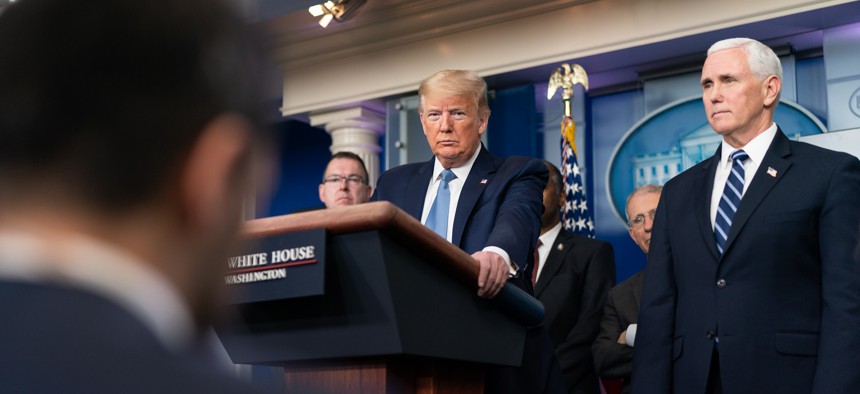
President Donald J. Trump, joined by Vice President Mike Pence and members of the White House Coronavirus Task Force, delivers remarks at a coronavirus briefing on Sunday. Andrea Hanks/White House
Why Trump Isn’t Using The Defense Production Act
He wants to allow corporations to sell vital medical gear to the highest-bidding states. Governors say that’s exactly the problem.
For a week, President Donald Trump has frustrated state governors and local lawmakers by insisting that he was using the Defense Production Act to boost production and improve allocation of badly needed medical supplies amid the spreading coronavirus crisis.
But pressed on whether the administration was using either of the act’s two main authorities to compel companies to help or to direct supplies to the worst-hit epicenters, officials were vague.
On Sunday, Trump and trade policy director Peter Navarro acknowledged that although the president signed an executive order last week nominally invoking the act, his administration is not using any of the emergency powers that it grants.
“We have the threat” of using the act’s legal powers, Trump said during a White House press conference on Sunday evening, but said that he believed voluntary contributions by the private sector have been sufficient.
“The Defense Production Act, sir, has given me quiet leverage,” Navarro said during the same press event. “When you have a strong leader, you can take a light hand, initially. We’re getting what we need without putting the heavy hand of government down.”
Pressure Rises
Governors and other state officials on the front lines of the coronavirus response aren’t buying it. Bidding wars on scarce equipment are pitting state against state, slowing the arrival of vital gear to some hard-hit areas and making it more expensive for all, state officials say. Some blame federal inaction, and want Trump to use his DPA authority to allocate resources under price caps.
“I’ll contract with a company for 1,000 masks. They’ll call back 20 minutes later and say the price just went up because they had a better offer,” Gov. Andrew Cuomo, D-N.Y., said Sunday. “And I understand that: Other states who are desperate for these goods, literally, offer more money than we were paying.
“The states simply cannot manage it. I'm competing with California and Illinois and Florida. And that’s not the way it should be.”
Trump on Monday signed an executive order that would allow the Justice Department to prosecute companies or individuals found to be price gouging precious medical supplies needed for coronavirus response efforts. The order gives Health and Human Services Secretary Alex Azar the power under the DPA to designate certain supplies as “critical” — meaning those found to be hoarding or price gouging them could face criminal penalties — but no items have yet been designated, according to Attorney General William Barr.
U.S. lawmakers on both sides of the aisle argue that corporations, of their own volition, will not produce medical supplies quickly and cheaply enough to allow the nation’s medical professionals to most effectively protect themselves and care for patients amid the pandemic.
In a phone call last week, Senate Minority Leader Chuck Schumer, D-N.Y., urged Trump to immediately make use of the act’s provisions, according to an aide. On Monday, three Democratic senators introduced legislation to compel the president to use his DPA authorities to issue purchase orders for N95 masks, among other things.
“Individual states…don’t have the buying power to generate a swift & massive industrial response,” Sen. Marco Rubio, R-Fla., tweeted last week. “It will require a federal effort (maybe in collaboration with EU) to mobilize private sector action on the scale & pace required.”
The Reasons
On Sunday, Trump gave a series of reasons for his decision to invoke, but not use, the DPA’s powers. He expressed a deep ambivalence for “nationalizing” U.S. business, a threat that he said sent “tremors through our business community.”
“We’re a country not based on nationalizing our business,” Trump said. “Call a person over in Venezuela; ask them how did nationalization of their businesses work out. Not too well. The concept of nationalizing our business is not a good concept.”
He argued that the federal government would be unable to determine which companies are capable of building needed equipment, like ventilators.
“Nobody would know where to start,” he said. “If I call companies and say, ‘You build ventilators,’ they don’t even know what a ventilator is.”
He also advanced a novel interpretation of the law’s powers: rhetorical, rather than practical.
“We have the threat of doing it, if we need it,” Trump said. “But we have millions of masks being done. We have respirators. We have ventilators. We have a lot of things happening right now. So just the threat of using it.”
“We are using it now. The fact that I signed it, it’s in effect,” Trump said.
The administration might also be concerned about the possibility of litigation if it leans too hard on the private sector, James Baker, a former chief judge to the United States Court of Appeals for the Armed Forces, said in a recent blog post.
“There is a genuine question as to whether the law can be used to compel a company to accept a new contract for a product or service it does not ordinarily provide, or only to prioritize existing contracts,” Baker said. “Were the government to use the law to the full extent of its potential, there might well be legal and political ramifications.”
“But the purpose of extraordinary authorities is extraordinary circumstances including emergencies,” he noted.
What Is Actually Happening?
Navarro on Sunday boasted that the invocation of the DPA — even without using its authorities — has led to “the greatest mobilization in the industrial base since World War Two.”
He gave several examples of voluntary contributions by the private sector: The French company Pernod Ricard has directed three of its facilities to produce hand sanitizer instead of alcoholic beverages; Honeywell is increasing production ofN95 masks and has promised to open another production line within 30 days.
But it’s not clear that voluntary efforts will be able to stem the shortfall. Hospital administrators and physicians for months have warned that they do not have enough protective equipment or ventilators to cope with the flood of covid-19 patients.
And Trump, meanwhile, has made a series of misleading or false claims about voluntary contributions from the private sector. He claimed on Saturday that General Motors and Ford “are making [ventilators] right now,” but neither company has yet begun production. According to fact checkers, both firms are in discussions with the Trump administration about helping but it would take them months, at minimum, to ramp up production.
Trump has also said that the clothing company Hanes will start churning out masks, but according to the company, they would not be the N95 masks deemed the most effective in protecting health-care workers from the virus. It’s also not clear when those masks will be ready.
Other apparel companies are also turning to produce masks, but they are not N95 masks.
American companies that were already set up to produce N95 masks have been limited by frozen supply chains. Industry officials have warned multiple administrations that the U.S. relied too heavily on other nations for vital medical supplies, putting it at risk of precisely the shortage crisis hospitals are now facing.
Asked how he will ensure that supplies go where they are most needed — another authority that the DPA grants the federal government — Trump provided little clarity.
“We are directing states — and sometimes we'll be competing against states, which I don't want, and we'll drop out of the bidding,” he said. “We want the states to go first.”
The supplies, he said, will go on the open market — exactly where governors say some of the problems arise.
“We want them on the open market from the standpoint of pricing,” Trump said. “Because otherwise, we could be very unfairly treated.”







